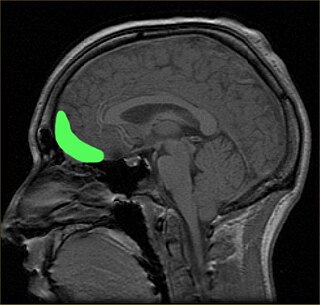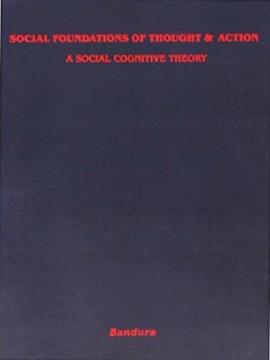Personality psychology is a branch of psychology that examines personality and its variation among individuals. It aims to show how people are individually different due to psychological forces. Its areas of focus include:
Antisocial personality disorder, sometimes referred to as dissocial personality disorder, is a personality disorder characterized by a limited capacity for empathy and a long-term pattern of disregard for or violation of the rights of others, starting before one was 15 years old. Other notable symptoms include impulsivity, reckless behavior, a lack of remorse after hurting others, deceitfulness, irresponsibility, and aggressive behavior.

Albert Bandura was a Canadian-American psychologist. He was a professor of social science in psychology at Stanford University.
Social learning theory is a theory of social behavior that proposes that new behaviors can be acquired by observing and imitating others. It states that learning is a cognitive process that takes place in a social context and can occur purely through observation or direct instruction, even in the absence of motor reproduction or direct reinforcement. In addition to the observation of behavior, learning also occurs through the observation of rewards and punishments, a process known as vicarious reinforcement. When a particular behavior is rewarded regularly, it will most likely persist; conversely, if a particular behavior is constantly punished, it will most likely desist. The theory expands on traditional behavioral theories, in which behavior is governed solely by reinforcements, by placing emphasis on the important roles of various internal processes in the learning individual. Albert Bandura is known for studying this theory.
Antisocial behaviours, sometimes called dissocial behaviours, are actions which are considered to violate the rights of or otherwise harm others by committing crime or nuisance, such as stealing and physical attack or noncriminal behaviours such as lying and manipulation. It is considered to be disruptive to others in society. This can be carried out in various ways, which includes, but is not limited to, intentional aggression, as well as covert and overt hostility. Anti-social behaviour also develops through social interaction within the family and community. It continuously affects a child's temperament, cognitive ability and their involvement with negative peers, dramatically affecting children's cooperative problem-solving skills. Many people also label behaviour which is deemed contrary to prevailing norms for social conduct as anti-social behaviour. However, researchers have stated that it is a difficult term to define, particularly in the United Kingdom where many acts fall into its category. The term is especially used in Irish English and British English.
Agency is the capacity of an actor to act in a given environment. It is independent of the moral dimension, which is called moral agency.
The social cognitive theory of morality attempts to explain how moral thinking, in interaction with other psychosocial determinants, govern individual moral conduct. Social cognitive theory adopts an "interactionist" perspective to the development of moral behavior. Personal factors of the individual, such as individual moral thought, emotional reactions to behavior, personal moral conduct, and factors within their environment, all interact with, and affect each other. Social cognitive theory contests, in many ways, with the stage theories of moral reasoning. Social cognitive theory attempts to understand why an individual uses a lower level of moral reasoning when they are, theoretically, at a higher level. It also attempts to explain the way social interactions help to form new, as well as change existing, moral standards. The influence of modeling and other such social factors are explored as functions of growth and development. Albert Bandura also believes that moral development is best understood by considering a combination of social and cognitive factors, especially those involving self-control.

The theory of planned behaviour (TPB) is a psychological theory that links beliefs to behavior. The theory maintains that three core components, namely, attitude, subjective norms, and perceived behavioural control, together shape an individual's behavioral intentions. In turn, a tenet of TPB is that behavioral intention is the most proximal determinant of human social behavior.
In psychology, self-efficacy is an individual's belief in their capacity to act in the ways necessary to reach specific goals. The concept was originally proposed by the psychologist Albert Bandura in 1977.
Oppositional defiant disorder (ODD) is listed in the DSM-5 under Disruptive, impulse-control, and conduct disorders and defined as "a pattern of angry/irritable mood, argumentative/defiant behavior, or vindictiveness". This behavior is usually targeted toward peers, parents, teachers, and other authority figures, including law enforcement officials. Unlike conduct disorder (CD), those with ODD do not generally show patterns of aggression towards random people, violence against animals, destruction of property, theft, or deceit. One-half of children with ODD also fulfill the diagnostic criteria for ADHD.
Self-regulation theory (SRT) is a system of conscious, personal management that involves the process of guiding one's own thoughts, behaviors and feelings to reach goals. Self-regulation consists of several stages. In the stages individuals must function as contributors to their own motivation, behavior, and development within a network of reciprocally interacting influences.

Monoamine oxidase A, also known as MAO-A, is an enzyme that in humans is encoded by the MAOA gene. This gene is one of two neighboring gene family members that encode mitochondrial enzymes which catalyze the oxidative deamination of amines, such as dopamine, norepinephrine, and serotonin. A mutation of this gene results in Brunner syndrome. This gene has also been associated with a variety of other psychiatric disorders, including antisocial behavior. Alternatively spliced transcript variants encoding multiple isoforms have been observed.
Personality development encompasses the dynamic construction and deconstruction of integrative characteristics that distinguish an individual in terms of interpersonal behavioral traits. Personality development is ever-changing and subject to contextual factors and life-altering experiences. Personality development is also dimensional in description and subjective in nature. That is, personality development can be seen as a continuum varying in degrees of intensity and change. It is subjective in nature because its conceptualization is rooted in social norms of expected behavior, self-expression, and personal growth. The dominant viewpoint in personality psychology indicates that personality emerges early and continues to develop across one's lifespan. Adult personality traits are believed to have a basis in infant temperament, meaning that individual differences in disposition and behavior appear early in life, potentially before language of conscious self-representation develop. The Five Factor Model of personality maps onto the dimensions of childhood temperament. This suggests that individual differences in levels of the corresponding personality traits are present from young ages.
Ecological systems theory is a broad term used to capture the theoretical contributions of developmental psychologist Urie Bronfenbrenner. Bronfenbrenner developed the foundations of the theory throughout his career, published a major statement of the theory in American Psychologist, articulated it in a series of propositions and hypotheses in his most cited book, The Ecology of Human Development and further developing it in The Bioecological Model of Human Development and later writings. A primary contribution of ecological systems theory was to systemically examine contextual variability in development processes. As the theory evolved, it placed increasing emphasis on the role of the developing person as an active agent in development and on understanding developmental process rather than "social addresses" as explanatory mechanisms.
Social cognitive theory (SCT), used in psychology, education, and communication, holds that portions of an individual's knowledge acquisition can be directly related to observing others within the context of social interactions, experiences, and outside media influences. This theory was advanced by Albert Bandura as an extension of his social learning theory. The theory states that when people observe a model performing a behavior and the consequences of that behavior, they remember the sequence of events and use this information to guide subsequent behaviors. Observing a model can also prompt the viewer to engage in behavior they already learned. Depending on whether people are rewarded or punished for their behavior and the outcome of the behavior, the observer may choose to replicate behavior modeled. Media provides models for a vast array of people in many different environmental settings.
Behavioural change theories are attempts to explain why human behaviours change. These theories cite environmental, personal, and behavioural characteristics as the major factors in behavioural determination. In recent years, there has been increased interest in the application of these theories in the areas of health, education, criminology, energy and international development with the hope that understanding behavioural change will improve the services offered in these areas. Some scholars have recently introduced a distinction between models of behavior and theories of change. Whereas models of behavior are more diagnostic and geared towards understanding the psychological factors that explain or predict a specific behavior, theories of change are more process-oriented and generally aimed at changing a given behavior. Thus, from this perspective, understanding and changing behavior are two separate but complementary lines of scientific investigation.
Neuroticism is a personality trait associated with negative emotions. It is one of the Big Five traits. Individuals with high scores on neuroticism are more likely than average to experience such feelings as anxiety, worry, fear, anger, frustration, envy, jealousy, pessimism, guilt, depressed mood, and loneliness. Such people are thought to respond worse to stressors and are more likely to interpret ordinary situations, such as minor frustrations, as appearing hopelessly difficult. Their behavioral responses may include procrastination, substance use, and other maladaptive behaviors, which may temporarily aid in relieving negative emotions and generating positive ones.

In psychology, impulsivity is a tendency to act on a whim, displaying behavior characterized by little or no forethought, reflection, or consideration of the consequences. Impulsive actions are typically "poorly conceived, prematurely expressed, unduly risky, or inappropriate to the situation that often result in undesirable consequences," which imperil long-term goals and strategies for success. Impulsivity can be classified as a multifactorial construct. A functional variety of impulsivity has also been suggested, which involves action without much forethought in appropriate situations that can and does result in desirable consequences. "When such actions have positive outcomes, they tend not to be seen as signs of impulsivity, but as indicators of boldness, quickness, spontaneity, courageousness, or unconventionality." Thus, the construct of impulsivity includes at least two independent components: first, acting without an appropriate amount of deliberation, which may or may not be functional; and second, choosing short-term gains over long-term ones.

Social Foundations of Thought and Action: A Social Cognitive Theory is a landmark work in psychology published in 1986 by Albert Bandura. The book expands Bandura's initial social learning theory into a comprehensive theory of human motivation and action, analyzing the role of cognitive, vicarious, self-regulatory, and self-reflective processes in psychosocial functioning. Bandura first advanced his thesis of reciprocal determinism in Social Foundations of Thought and Action.
Social determinism is the theory that social interactions alone determine individual behavior.




